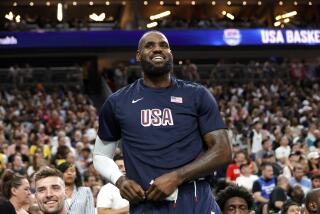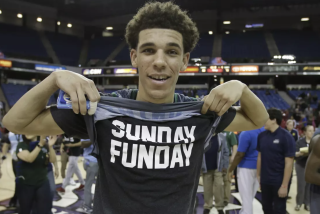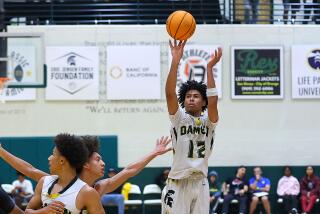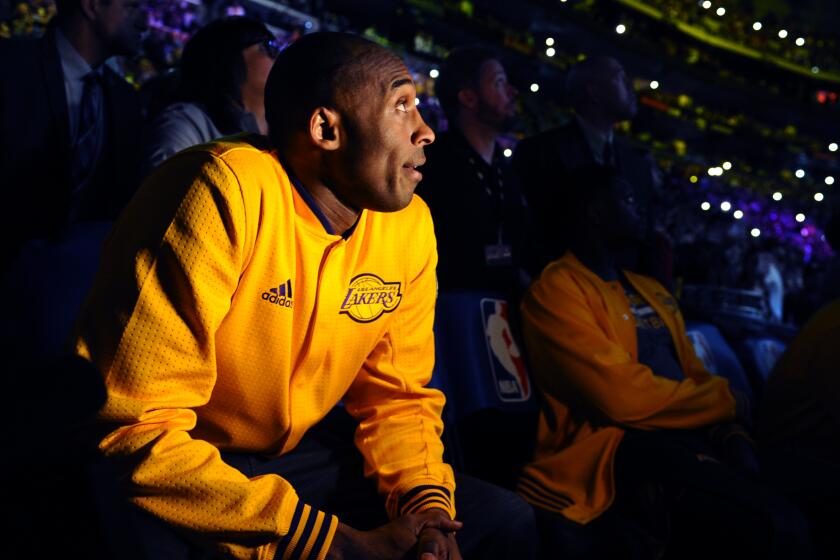Hill’s Got the Touch
- Share via
AUBURN HILLS, Mich. — As if Grant Hill needed to get better.
The jaw-dropping dunks, the routine double-digit scoring, the All-Star Games. They just weren’t enough for one of the NBA’s best.
So, he worked hard over the summer, taking jumper after jumper after jumper, to develop something he had always lacked: a true shooting touch.
The result? One scary player. Make that scarier.
“Right now, he’s probably the best total package in the league,” Orlando forward Monty Williams said after Hill scored 42 points against the Magic with eight assists and seven rebounds on Jan. 3. “Now that he has added that 3 to his game, he’s going to be hard to stop.”
Very hard. Through the first 33 games of the season, Hill averaged 27.8 points, 7.1 better than his five-year career average. In the first four games of 2000, he scored 42, 42, 31 and 40 points.
The change can be attributed to that improved outside shot, which used to be so weak that teammates and opponents kidded him about it. Nobody’s kidding anymore.
The turnaround began in the fall of 1998 when Hill hired a personal shooting coach, Chip Engelland, who played at Hill’s alma mater, Duke. Engelland found Hill to be an eager student.
“Grant is a sponge,” said Engelland, who also worked with Steve Kerr when he was with Chicago. “He can take in information and say, ‘Oh, yeah, I haven’t done that, drop step, spin move.’ He takes in information like no player I’ve ever known.”
Engelland is at practice each morning. He’s at every game. He goes with Hill on the road, to Europe, anywhere Hill’s busy schedule takes him. With minor exceptions, of course.
Last summer, Hill and Engelland worked until three days before Hill’s wedding to singer Tamia Washington. The newlyweds honeymooned in Indonesia--alone.
But when Hill had to fly to Italy, Greece and Germany as part of an endorsement deal, Engelland went along. During breaks, they would practice anywhere they could.
“We practiced in some funky places,” Hill said. “We saw some really different gyms, I can tell you that.”
It wasn’t that Hill couldn’t shoot a jumper at all; he was just inconsistent. So the extended shooting sessions with Engelland resulted in some major tweaking.
“It was kind of an overhaul,” Engelland said. “He had to improve his balance, using his feet better, pushing his shot equally. We worked his hand placement on the ball, his release point, which is a tough area. He was releasing a little more out front. He had to get a little more up, to get a higher arc.”
The long hours produced better technique and more confidence. One fed the other.
Hill was the only Detroit player to start all 50 games in the 1999 season shortened by the NBA lockout. His free-throw percentage went up from .740 to .752 and his field-goal percentage went from .452 to .479. Through the first 33 games this season, he was shooting .486 from the field and .823 from the line.
“Last year I was sort of learning on the fly,” Hill said. “This past summer, I got a lot of shots up.”
That first year, he didn’t do anything outside of 15 feet. Last summer, Hill and Engelland stepped it up: post-ups, 3-point shots, 15- to 18-footers, and more free throws.
Free throws are important because Hill has benefited from the new rules against grabbing and holding. He gets fouled often.
Coach Alvin Gentry has noticed the improvement, both mentally and physically.
“Last year, he would kind of shoot it, but mostly he would put the ball on the floor and drive with it,” Gentry said. “Now, if he’s got an open shot, there’s no hesitation.”
Hill’s 155 points in the first four games of the year were the highest four-game total for a Detroit player since Kelly Tripucka scored 160 in 1982. Hill is the first Pistons player to score more than 30 in four consecutive games since Joe Dumars in 1993.
Hill already had made a career-best 18 3-point shots through the team’s first 33 games. In his first five years, he made only 22 treys--total.
The Pistons started slowly, but Hill has the team over .500 and dreaming about going beyond the first round of the playoffs.
“We’ll go as far as he takes us,” Gentry said.
The timing of Hill’s improvement couldn’t be any better for him. He could decide to become a free agent after this season. If not, he would remain under contract through the 2002-03 season, the final year of a deal worth $45 million.
The Pistons don’t intend to let Hill get away, though. In the meantime, he’s making the players around him better.
Jerry Stackhouse and Christian Laettner--Hill’s old Duke teammate--both have seen their games swept along on his coattails.
Stackhouse is playing as well as ever, averaging over 22 points a game. Laettner, healthy and feisty again, is averaging almost 14 points and seven rebounds.
“It’s not just one or two guys,” Hill said. “We’re slowly starting to build it.”
And it all starts with Hill.
More to Read
All things Lakers, all the time.
Get all the Lakers news you need in Dan Woike's weekly newsletter.
You may occasionally receive promotional content from the Los Angeles Times.







